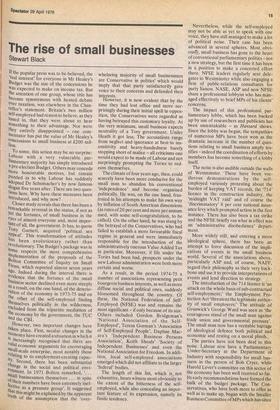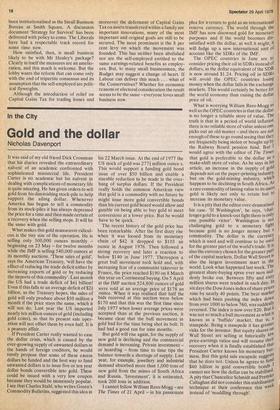The rise of small businesses
Stewart Black
If the popular press was to be believed, the 'real interest' for everyone in Mr Healey's Budget was the size of the concessions he was expected to make on income tax. But the attention of one group, whose title has become synonymous with heated debate over taxation, was elsewhere in the Chancellor's statement. Britain's two million self-employed had reason to believe, as they tuned in, that they were about to hear something to their advantage. Nor were they entirely disappointed — one cornMentator has put the value of Mr Healey's concessions to small business at £200 million.
To some, this action may be no surprise: Labour with a very vulnerable parliamentary majority has simply introduced a Pre-election Budget. Others may concede More honourable motives, but remain Puzzled as to why Labour has suddenly adopted Dr Schumacher's by now famous Slogan five years after. There are two questions here. Why have these measures been introduced, and why now? Closer study reveals that there has been a remarkable reversal in the status, if not as Yet the fortunes, of small business in the eyes of almost everyone and, most important of all, the government. It has, to quote Tony Garnett, acquired 'political sex a,P r
Pea. This transformation of attitudes has been evolutionary rather than revolutionary. The Budget's package was in some respects the most comprehensive implementation of the proposals of the Bolton Committee of Inquiry on Small Firms, which reported almost seven years ago. Indeed during the interval there is evidence that the fortunes of the small business sector declined even more steeply as a result, on the one hand, of the deterioration of the economy in 1973-75 and on the other of the self-employed finding themselves politically in the wilderness, excluded from the tripartite mediation of the economy by the government, the TUC and the CBI.
However, two important changes have taken place. First, secular changes in the Fconomy have created a situation in which it IS increasingly recognised that there are valid economic arguments for encouraging small-scale enterprise, most notably those !elating to its employment-creating capacItY. Second, there has been substantial Change in the social and political environment. In 1971 Bolton remarked, small businessmen themselves . . . in spite their numbers have been extremely inefte, etive as a pressure group'. It suggested
t'at this might be explained by the apparent t111th of the assumption that the `over whelming majority of small businessmen are Conservative in politics' which would imply that that party satisfactorily gave voice to their concerns and defended their interests.
However, it is now evident that by the time they had lost office and more surprisingly during their initial spell in opposition, the Conservatives were regarded as having betrayed this customary loyalty. At the very minimum, small business expects neutrality of a Tory government. Under Heath it got less. The accusations range from neglect and ignorance at best-to insensitivity and heavy-handedness barely stopping short of malice — all criticisms one would expect to be made of Labour and not surprisingly prompting the Tories to redeem themselves.
The climate of four years ago, then, could scarcely have been more conducive for the small man to abandon his conventional 'independence' and become organised politically. He was, on the one hand, frustrated in his attempts to make his own way by inflation of South American dimensions (as rates of 20 per cent and more per annum used, with some self-congratulation, to be called). On the other hand, he was stung by the betrayal of the Conservatives, who had failed to establish a more favourable fiscal regime in general and were immediately responsible for the introduction of the administratively onerous Value Added Tax in particular. Moreover, if life under the Tories had been bad, prospects under the new Labour administration were both more certain and worse.
As a result, in the period 1974-75 a number of associations representing petit bourgeois business interests, as well as more diffuse social and political ones, suddenly blossomed throughout the country. Of these, the National Federation of SelfEmployed (NFSE) was and remains the most significant — if only because of its size. Others included Gordon Bridgeman's 'National Association of the SelfEmployed', Teresa Gorman's 'Association of Self-Employed People', Daphne Macara's 'Independent Business Persons Association', Keith Shouls"Society of Independent Businesses' and even the National Association for Freedom. In addition, local self-employed associations emerged which did not affiliate to the larger 'federal' bodies.
The length of this list, which is, not exhaustive, bears witness most obviously to the extent of the bitterness of the selfemployed, while also concealing an important feature of its expression, namely its fissile tendency. Nevertheless, while the self-employed may not be able as yet to speak with one voice, they have still managed to make a lot of political noise. Their case has been advanced in several spheres. Most obviousfY, small business has gone to the heart of conventional parliamentary politics —not a new strategy, but the first time it has been in a position to make a concerted effort there. NFSE leaders regularly sent delegates to Westminster while also engaging a firm of public-relations consultants for party liaison. NASE, ASP and now NFSE share a professional lobbyist who has managed effectively to brief MPs of his clients' concerns.
The impact of this professional parliamentary lobby, which has been backed up by use of researchers and publicists has been unmistakable — as Hansard shows. Since the lobby was began, the sympathies of numerous MPs have been won as the dramatic increase in the number of questions relating to small business amply testifies — indeed the coordination of efforts by members has become something of a lobby itself.
The noise is also audible outside the walls of Westminster. 'There have been vociferous demonstrations by the selfemployed variously protesting about the burden of keeping VAT records, the '714' licence in the construction industry, the 'midnight VAT raid' and of course the 'discriminatory' 8 per cent national insurance levy which prompted action in the first instance. There has also been a tax strike and the NFSE briefly ran what in effect was an 'administrative disobedience' department.
More widely still, and entering a more ideological sphere, there has been an attempt to force discussion of the implications of events in the small business world. Several of the associations above, particularly ASP and, of course, NAFF, regard their philosophy as their very backbone and use it to provide interpretations of events and lend direction to strategy.
The introduction of the 714 licence is 'an attack on the whole basis of sub-contractual self-employment;' the Employment Protection Act 'threatens the legitimate authority of small employers:' The attitude of Grunwick's George Ward was seen as 'the courageous stand of the small man against trade union and governmental pressure'. The small man now has a veritable barrage of ideological defence both political and economic and resting on a moral plinth..
The parties have not been deaf to this noise. Labour now have a Parliamentary Under-Secretary at the Department of Industry with responsibility for small business in the person of Bob Cryer, while Harold Lever's committee on this sector Of the economy has been well received so far. Its early recommendations have formed the bulk of the budget package. The Conservatives, who have both more to offer as well as to make up, began with the Smaller Business Committee of MPs which has since been institutionalised as the Small Business Bureau at Smith Square. A discussion document 'Strategy for Survival' has been delivered with policy to come. The Liberals have had a respectable track record for some time now.
How satisfied, then, is small business likely to be with Mr Healey's package? Clearly in itself the measures are an amelioration, and this much is welcome. But the lobby wants the reform that can come only with the end of tripartite consensus and its assumption that the self-employed are political flyweights.
Although the introduction of relief on Capital Gains Tax for trading losses and moreover the deferment of Capital Gains Tax on assets transferred within a family are important innovations, many of the most important and original goals are still to be secured. The most prominent is the 8 per cent levy on which the movement was founded. This has neither been abolished nor are the self-employed entitled to the same earnings-related benefits as employees. But, to many small businessmen, the Budget may suggest a change of heart. If Labour can deliver this much . . . what of the Conservatives? Whether for economic reasons or electoral consideration the result seems to be the same —everyone loves small business now.



































 Previous page
Previous page